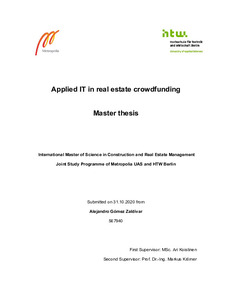Applied IT in real estate crowdfunding
Gomez Zaldivar, Alejandro (2020)
Gomez Zaldivar, Alejandro
2020
Julkaisun pysyvä osoite on
https://urn.fi/URN:NBN:fi:amk-202202222755
https://urn.fi/URN:NBN:fi:amk-202202222755
Tiivistelmä
This work initiated by analyzing the ways on which real estate crowdfunding (RECF) recently entered the personal finance and construction sectors. From the observation of certain RECF platforms on the internet and studying topics of sustainability in the built environment, the scope of the work incorporated notions of applied technology in the PropTech realm, namely the fields of data science, artificial intelligence and blockchain and cryptocurrencies, as well as trends in the real estate and tourism sectors where these concepts could be applied. The interactions of these topics were studied, as well as the projections or possibilities of its expansion beyond the urban limits.
The methodology followed a rational thinking of the topics using multiple case studies and grounded theory as research strategies which resulted in a pragmatic approach. Broader topics were generated in a thematic analysis and insights were identified from a semantic perspective from the primary and secondary literature, including primary data from communication with industry representatives.
The results show an increasing adoption of ICT tools in all areas and phases of real estate and tourism, and a steady interest in RECF as a financing and investment tool, especially for amateur investors. Numerous examples of interactions among the tools and its field of application were registered, but no evidence of RECFs ventures in non-urban location was found. It is expected, though, that this RECF could expand its scope and business models since it is a very recent phenomenon.
The methodology followed a rational thinking of the topics using multiple case studies and grounded theory as research strategies which resulted in a pragmatic approach. Broader topics were generated in a thematic analysis and insights were identified from a semantic perspective from the primary and secondary literature, including primary data from communication with industry representatives.
The results show an increasing adoption of ICT tools in all areas and phases of real estate and tourism, and a steady interest in RECF as a financing and investment tool, especially for amateur investors. Numerous examples of interactions among the tools and its field of application were registered, but no evidence of RECFs ventures in non-urban location was found. It is expected, though, that this RECF could expand its scope and business models since it is a very recent phenomenon.
